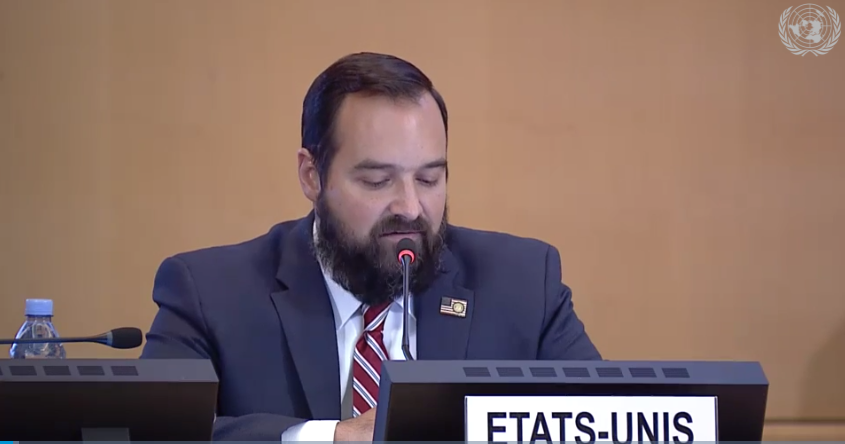” It is our most solemn belief that every person across the globe is born free and equal in dignity and rights and is entitled to respect for his or her inalienable human rights and fundamental freedoms.”
Ambassador Andrew Bremberg
Yesterday on November 9, 2020, the United States Department of State, Bureau of Democracy, Labor, and Human Rights, along with other U.S. agencies, presented the third Universal Periodic Review before the United Nations Human Rights Committee outlining the nations’ implementation of human rights laws.

United States Ambassador and Representative of to the UN and other international organizations in Geneva, Andrew Bremberg, opened the hearing with a general statement about U.S. commitment and progress in the human rights arena.
The Universal Periodic Review (UPR) is “a unique process which involves a review of the human rights records of all UN Member States.” It is an opportunity for each member state to present “what actions they have taken to improve the human rights situations in their countries and fulfill their human rights obligations.” This process’s main goal is to improve the implementation and enforcement of human rights laws in all countries and highlight any violations that took place before the hearing.
The hearing started with the U.S. Ambassador Andrew Bremberg, who serves as the Representative of the U.S. to the Office of the UN and other international organizations in Geneva, making an overall statement about the U.S. progress in implementing human rights laws and the nations’ “long-standing tradition of respect and leadership for human rights globally.”
Ambassador Bremberg was joined virtually by other representatives of various U.S. government agencies, including Assistant Secretary Robert Destro, for the Bureau of Democracy, Human rights, and Labor at the U.S. Department of State, and the Deputy Assistant to the Attorney General and Chief of Staff of the Civil Rights Division at the Department of Justice, Alexandre Maugeri.
Ambassador Bremberg highlighted the United States’ commitment, being both political and moral, to protecting human rights and outlined the separation of powers and transparency of the judicial and political system to answer domestic human rights violations. Ambassador highlighted specifically the freedom of the press, freedom of assembly, the free and fair election process, in which all rights make the government answerable to citizens’ concerns.
The progress outlined by Ambassador Bremberg in the U.S. included:
- The U.S. Attorney General’s memorandum, pursuant to the 2017 Executive Order 13798, on religious freedom and liberty protections in U.S. federal law that guides all federal executive departments.
- The International Religious Freedom Alliance launched earlier this year to join 25 other member states in advancing freedom of religion and belief worldwide.
- Secretary Pompeo and Secretary Azar leading the U.S. last month in joining 33 countries in signing the Geneva’s Consensus Declaration, a declaration supporting defending life and protecting the family.
Before opening the floor to questions by a troika of Human Rights Committee Members (known as rapporteurs) and later recommendations by other countries, Ambassador Bremberg highlighted that the United States “welcome[s] transparency and constructive criticism” and is “willing to acknowledge [its] shortcomings openly.”
Following Ambassador Bremberg’s opening statement, Assistant Secretary Robert Destro presented the report encompassing the work of the Departments of State, Interior, Justice, Homeland Security, Labor, Housing and Urban Development, Health and Human Services, Education, Defense, and other departments and agencies on matters of human rights concern. Destro emphasized that the U.S. role is “not only to explain how [the nations’] domestic policies and practices promote and protect the human rights of [the American] people, but also to advance the universal human rights that [the UN] is intended to elevate.”
Later on, Deputy Assistant Attorney General Alexander Maugeri outlined conditions of detention in the nation and highlighted that the Department of Justice, Civil Rights Division “is currently pursuing matters involving allegations of misuse of solitary confinement at the state and local levels throughout the country.”
Throughout the hearing, the U.S. consistently highlighted the challenges that the country faced after the tragedy of George Floyd’s death, which was also a priority concern to highlight by many countries when presenting their recommendations to the U.S. The excessive use of force by law enforcement and discrimination against African Americans was of high importance during the hearing. Many countries also recommended the U.S. to ratify important human rights treaties, such as the Convention on the Elimination of All Forms of Discrimination Against Women, while others urged the nation to refrain from imposing restrictions on abortions and limiting women’s right to bodily autonomy.
In addition to civil rights and freedom of religion or belief, the U.S. also highlighted issues of privacy facing the nations, specifically underlining non-state actors’ role in privacy such as Google and Facebook, and acknowledging that “all persons have legitimate privacy interests in the handling of their personal information.”
In the conclusion of the hearing, and upon the submission of the U.S. to its full national report, the Working Group of the committee will review all the information and recommendations, and a report, known as the “outcome report,” will be prepared by the troika and under the review and assistance of the OHCHR. The report will “consist of the questions, comments, and recommendations made by States to the country under review, as well as the responses by the reviewed State.” Then, the U.S. has the “primary responsibility to implement the recommendations contained in the final outcome.”
As we wait for the outcome report to be issued, we hope the U.S. takes into account all the recommendations presented during the hearing to be implemented with the start of year 2021.
Click here to read the full national report submitted by the United States in English. You can find the report in other languages here.
Click here to watch the entire recorded hearing.